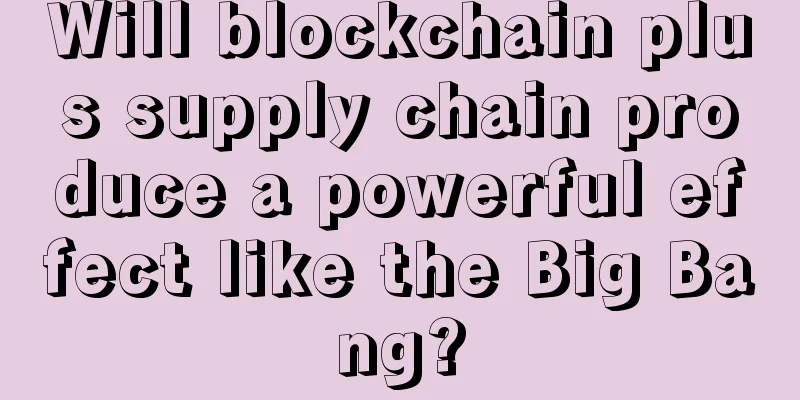Will blockchain plus supply chain produce a powerful effect like the Big Bang?

|
There is so much talk about blockchain, so let’s start with the basics. Blockchain is a distributed public ledger that enables transactions to be conducted in a trusted environment, and it is the underlying technology behind the concept of Bitcoin. A network of computers uses cryptography to allow everyone in the open source network to update the ledger in a secure way without the need for a central authority. The process is virtually impossible to hack, and doesn’t even require a centralized platform. However, one thing that has opened Pandora's box is that blockchain technicians have identified a variety of ways to put blockchain technology into practical applications. Given the potential advantages that a secure environment can provide, everyone expects blockchain to bring a series of benefits to various industries, including tagging drugs and medical records without revealing any sensitive information, using smart contracts to eliminate piracy in the music and film industries, reducing the time and cost of lengthy legal procedures, ensuring voter verification in electronic voting, helping banks and financial services companies solve fraud problems, and promoting lower transaction costs and faster transactions. It should come as no surprise that the financial services industry giants are at the forefront of the blockchain trend. They are all happy to embrace this digital disruptive technology. For the record, R3 CEV (an industry-wide consortium of 42 investment banks) recently conducted a simulated transaction using blockchain technology and is now considering the possibility of using blockchain technology for further testing. Even large banks such as Bank of America, Development Bank of Singapore (DBS) and Standard Chartered are apparently developing blockchain technology for trade finance. Technology giants such as IBM and Microsoft have also announced their blockchain development plans, including the Microsoft Azure Blockchain as a Service (BaaS) project. Consulting firm Accenture has even proposed a smart socket that helps regulate electricity consumption and select suppliers with lower electricity prices. Stepping back, even if Bitcoin eventually fails, its underlying technology (blockchain technology) will still be here. Blockchain technology will certainly attract the interest of buyers because of its potential to improve trust and visibility in the supply chain. A transparent supply chain is a dream come true for purchasing groups because it can avoid unethical practices such as material conflicts, counterfeit products or toxic materials. Transactions on a decentralized network are low-cost, fast, and can track quality assurance throughout the product value chain. There are many benefits to using blockchain technology for procurement. Provenance is a London-based startup that is providing solutions for tracking product authenticity, bringing greater transparency and trust to customers' supply chains. Provence's pilot project is to track the origin or source of tuna caught in Indonesia and sold in Japan. Provence issues a digital passport to the product that guarantees its authenticity and origin. Therefore, sustainable and ethical sourcing and effective product tracking methods do not seem to be far away. Meanwhile, California startup Skuchain is focusing on finding ways to use blockchain technology to boost supply chain financing and unlock billions of dollars in value hidden in letters of credit by creating a paperless environment. These blockchain technologies are expected to revolutionize the $18 trillion global trade finance market by facilitating collaboration among stakeholders in the supply chain network. Blockchain technology can definitely be applied to the supply chain, but it depends on how fast the procurement industry develops. Customers and governments will become more and more aware of blockchain and demand more transparency, traceability and speed. Blockchain technology holds the key to eliminating blind spots in the supply chain. |
<<: Technical analysis of Ethereum market: the price trend is not optimistic
Recommend
IBM: 90% of government agencies will invest in blockchain technology in 2018 (Download the full report)
IBM's Business Value Institute released a blo...
Bitcoin hashrate hits new highs, with more than 500,000 new mining machines coming online in the past three months
Bitcoin hashrate has hit a new high again, indica...
Is it a good thing that the marriage line bends downwards? Can the marriage last forever?
A complete illustration of the marriage line in p...
Illustration of moles on hands
We all have at least one mole in our body, and th...
A woman in Xiamen invested in "Bitcoin" and was defrauded of 360,000 yuan in 3 days!
▲A large amount of cash and more than 30 bank car...
Is it good for a woman to have a mole on the back of her right hand? What does a mole on the back of a woman’s hand mean?
The factors that influence people's fortune i...
Face reading: what are the fate characteristics of people with big mouths? What does a big mouth mean?
A person with a big mouth If a person is talkativ...
The face of a charismatic leader
In life, some people have strong leadership skill...
Token economics in music cannot be ignored
The concept of "token economics" is use...
RRMine attended the Web3.0 China Summit to help the IPFS distributed storage industry prosper
On April 9, the Web3.0 China Summit and Distribut...
Palmistry Marriage Line Diagram (VI): Palmistry Diagram for Husband and Wife Disharmony
Palmistry Marriage Line Diagram (VI): Palmistry D...
What do the different starting points and ending points on the career line represent?
The career line represents responsibility and obl...
$4,000 Ethereum is just the beginning
Ethereum successfully broke through $4,000 last w...
Massive debanking: How DeFi can complete Bitcoin’s unfinished business
Broadly speaking, 2020 was the year of the COVID-...
The man who brings bad luck to you is unreasonable and has a stern face.
A person with a bad character does not seem to be...









